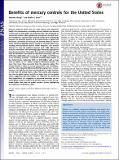| dc.contributor.author | Giang, Amanda Chi Wen | |
| dc.contributor.author | Selin, Noelle E | |
| dc.date.accessioned | 2017-01-24T21:57:51Z | |
| dc.date.available | 2017-01-24T21:57:51Z | |
| dc.date.issued | 2015-12 | |
| dc.date.submitted | 2015-07 | |
| dc.identifier.issn | 0027-8424 | |
| dc.identifier.issn | 1091-6490 | |
| dc.identifier.uri | http://hdl.handle.net/1721.1/106606 | |
| dc.description.abstract | Mercury pollution poses risks for both human and ecosystem health. As a consequence, controlling mercury pollution has become a policy goal on both global and national scales. We developed an assessment method linking global-scale atmospheric chemical transport modeling to regional-scale economic modeling to consistently evaluate the potential benefits to the United States of global (UN Minamata Convention on Mercury) and domestic [Mercury and Air Toxics Standards (MATS)] policies, framed as economic gains from avoiding mercury-related adverse health endpoints. This method attempts to trace the policies-to-impacts path while taking into account uncertainties and knowledge gaps with policy-appropriate bounding assumptions. We project that cumulative lifetime benefits from the Minamata Convention for individuals affected by 2050 are $339 billion (2005 USD), with a range from $1.4 billion to $575 billion in our sensitivity scenarios. Cumulative economy-wide benefits to the United States, realized by 2050, are $104 billion, with a range from $6 million to $171 billion. Projected Minamata benefits are more than twice those projected from the domestic policy. This relative benefit is robust to several uncertainties and variabilities, with the ratio of benefits (Minamata/MATS) ranging from ≈1.4 to 3. However, we find that for those consuming locally caught freshwater fish from the United States, rather than marine and estuarine fish from the global market, benefits are larger from US than global action, suggesting domestic policies are important for protecting these populations. Per megagram of prevented emissions, our domestic policy scenario results in US benefits about an order of magnitude higher than from our global scenario, further highlighting the importance of domestic action. | en_US |
| dc.description.sponsorship | National Science Foundation (U.S.). (Awards 1053648 and 131755) | en_US |
| dc.description.sponsorship | Natural Sciences and Engineering Research Council of Canada | en_US |
| dc.description.sponsorship | Massachusetts Institute of Technology. Department of Earth, Atmospheric, and Planetary Sciences (J. H. and E. V. Wade Fund) | en_US |
| dc.description.sponsorship | Massachusetts Institute of Technology. Sociotechnical Systems Reseach Center (Stokes Fund) | en_US |
| dc.language.iso | en_US | |
| dc.publisher | National Academy of Sciences (U.S.) | en_US |
| dc.relation.isversionof | http://dx.doi.org/10.1073/pnas.1514395113 | en_US |
| dc.rights | Article is made available in accordance with the publisher's policy and may be subject to US copyright law. Please refer to the publisher's site for terms of use. | en_US |
| dc.source | PNAS | en_US |
| dc.title | Benefits of mercury controls for the United States | en_US |
| dc.type | Article | en_US |
| dc.identifier.citation | Giang, Amanda, and Noelle E. Selin. “Benefits of Mercury Controls for the United States.” Proceedings of the National Academy of Sciences 113.2 (2016): 286–291. © 2016 National Academy of Sciences | en_US |
| dc.contributor.department | Massachusetts Institute of Technology. Institute for Data, Systems, and Society | en_US |
| dc.contributor.department | Massachusetts Institute of Technology. Department of Earth, Atmospheric, and Planetary Sciences | en_US |
| dc.contributor.department | Massachusetts Institute of Technology. Engineering Systems Division | en_US |
| dc.contributor.mitauthor | Giang, Amanda Chi Wen | |
| dc.contributor.mitauthor | Selin, Noelle E | |
| dc.relation.journal | Proceedings of the National Academy of Sciences | en_US |
| dc.eprint.version | Final published version | en_US |
| dc.type.uri | http://purl.org/eprint/type/JournalArticle | en_US |
| eprint.status | http://purl.org/eprint/status/PeerReviewed | en_US |
| dspace.orderedauthors | Giang, Amanda; Selin, Noelle E. | en_US |
| dspace.embargo.terms | N | en_US |
| dc.identifier.orcid | https://orcid.org/0000-0002-0146-7038 | |
| dc.identifier.orcid | https://orcid.org/0000-0002-6396-5622 | |
| mit.license | PUBLISHER_POLICY | en_US |
